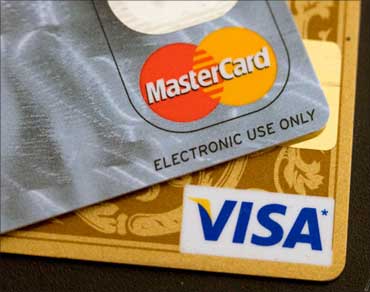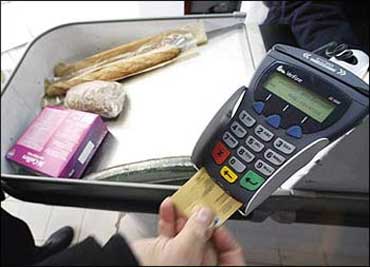Manojit Saha in Mumbai
IndiaPay, the country's first indigenous payment gateway, is set to take on the global big boys - MasterCard and Visa - when it launches in the middle of next year.
The National Payments Corporation of India, the owner of IndiaPay, will fire the first salvo by charging only half what MasterCard and Visa levy on merchant establishments.
At present, merchant establishments are charged Rs 2 for every transaction worth Rs 100.
A card's issuing bank gets around 80 per cent of that, while the merchant's bank or acquirer bank gets 15 per cent.
The service provider gets the remaining 5 per cent. The cost of card usage, if borne by a merchant establishment, could eat up 50 per cent of its profit.
That is seen as factor for the low acceptability of cards among small and medium merchants.
...
Move over Visa, MasterCard. IndiaPay is here
Observers ask if NPCI halves the transaction charge, why banks would issue IndiaPay cards when it's a losing proposition for them.
The reason is simple: if merchants have to absorb a lower transaction charge, they will increasingly insist on IndiaPay.
"We expect merchant demand for the product will force banks to adopt IndiaPay," said a source.
Still, there are several issues that need to be sorted out before IndiaPay gains acceptability.
Firstly, point-of-sale terminals, in which banks have made huge investments, are configured for MasterCard and Visa cards.
But NPCI is confident that this problem can be solved, as it has the backing of the government.
...
Move over Visa, MasterCard. IndiaPay is here
IndiaPay's shareholders consist of 10 banks, six of which are public sector banks. It is promoted by the Reserve Bank of India.
The government and the central bank want to promote transactions channelled through banks, rather than in cash, which is an inefficient mode of payment.
Money lying as cash in the hands of an individual does not have any multiplier effect, but can be leveraged if it is with banks.
Around 95 per cent of transactions in India are still carried out in cash, and studies suggest underutilisation of debit cards.
According to a technical paper by Ashish Das and Rakhi Agarwal of the Indian Institute of Technology, Bombay, though there are 19 million credit cards and 190 million debit cards in the system, there are just 11 transactions per credit card and one transaction per debit card a year.
...
Move over Visa, MasterCard. IndiaPay is here
The study further says there are 500,000 point-of-sale terminals in the country. On average, a terminal sees less than one debit card transaction and 1.3 credit card transactions a day.
Studies have also found a correlation between efficiency in monetary transactions and increase in economic growth.
A 10 per cent increase in card payments can contribute 0.5 per cent to GDP growth. And that is what the government and the banking regulator is aiming for.
NCPI is planning IndiaPay only for debit cards to encourage and increase their use among Indians.
The risk-free nature of debit card transactions, compared to those of credit cards, is considered more suitable for Indians, most of whom are seen as risk averse.





article